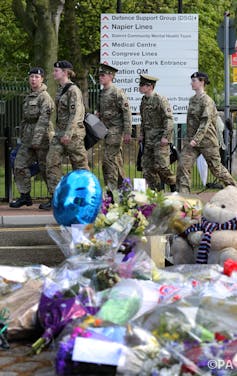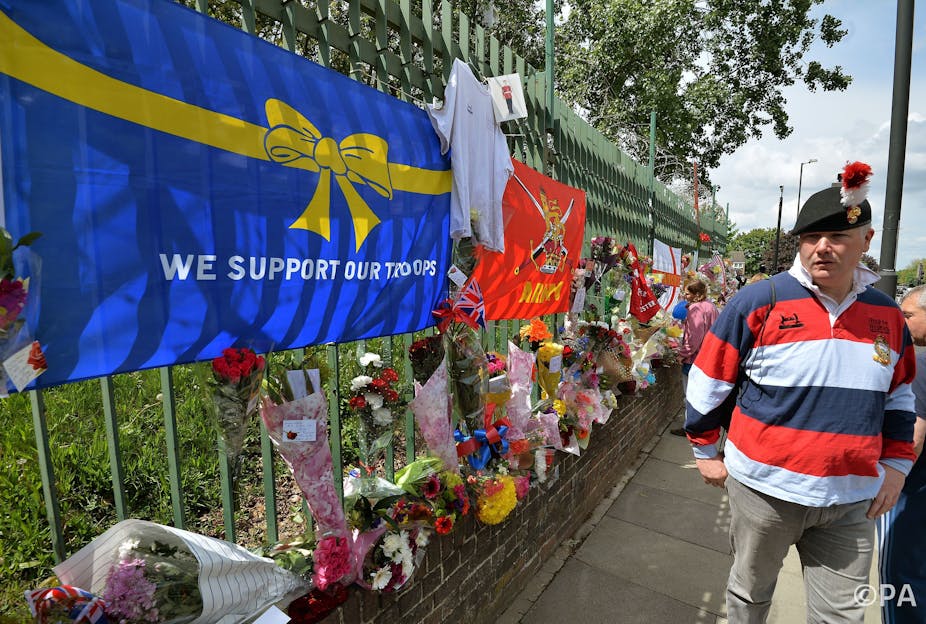The murder of British army drummer Lee Rigby on the streets of Woolwich last week raises important questions about the domestic security of the United Kingdom, the government’s counterterrorism strategy, about the consequences of foreign policy decisions and about the resilience of British society.
The manner of Drummer Rigby’s death is a very deep shock to Britain’s sense of security. In the response to the murder, various security and protection measures will have been put in place in order to prevent a “copy-cat” attack. But it is not obvious that broader security strategy could, or indeed should, be altered as a result.
Without knowing more about the alleged attackers, it is difficult to see how the security services could have prevented an attack such as this. With thousands of individuals reported to be “of interest” to UK security services and police, it is inconceivable that each of these people could be under direct surveillance without considerable expense and infringement of civil freedoms. And even then, what might have triggered police preventative action?
If these were men who were “self-radicalised” and chose to act as so-called “lone wolves”, then the UK government’s efforts at counter-radicalisation must come under renewed scrutiny. Whereas if they were part of a centrally directed, “home-grown”, multi-point terrorist campaign of the sort seen in London, Madrid and most recently in Boston then the organisers and directors of these attacks should be sought out.
Perhaps, rather than self radicalisation, the Woolwich murder points to a programme of facilitated radicalisation with no discernible central organisation or chain of command and no more effort required than the maintenance of extremist websites and the publication of journals such as al-Qaeda’s Inspire. If so, it is difficult to see what security agencies should do and where they should focus their attention.
In such circumstances the armed forces might be expected to become generally more security conscious, putting in place a range of personnel and site security measures and restricting the movement and appearance of soldiers as well as access to certain areas.
‘Unbreakable bond of identity, loyalty and responsibility’
But would this be the most desirable outcome? As it analyses the Woolwich attack, the government must also consider the challenge it represents to a central feature of British society: its relationship with its armed forces. The UK Military Covenant speaks of “an unbreakable common bond of identity, loyalty and responsibility” between society and its armed forces who must “always be able to expect fair treatment, to be valued and respected as individuals and that they (and their families) will be sustained and rewarded by commensurate terms and conditions of service”.

The Military Covenant, in other words, is both an expression of mutual respect and an assurance of duty of care. In the light of Drummer Rigby’s murder the balance between these two imperatives must be maintained.
A very fine judgement is needed as to the balance of risk. During the decades of Northern Ireland-related terrorism it was forbidden to wear military uniform in public, arguably for good reason. It is now commonplace to see uniform worn in public, indicative of the confidence of the armed forces in the security of their own country, of the respect in which they are held by the public, the media and the political class, and more generally of society’s resilience.
After Woolwich, it might be argued that to allow uniform to be worn in public would be to expose military men and women to gratuitous risk, thus breaching the duty of care. But to forbid military uniform would be to turn the clock back to a much less secure and more threatening time and would arguably be an overreaction.
Once the precautionary principle is applied it is difficult to know where it should stop; should military families and veterans’ organisations all be subjected to a security “lock-down” of some sort? Such a step would erode the “common bond” which has consolidated so visibly yet so quietly in recent years. If, on their return from combat operations, military men and women were ordered not to wear their uniform in public this could scarcely be described as the act of a society confident of its actions and respectful of its armed forces.
Society’s resilience to terrorist attacks is much more easily dismantled than it is built. Perhaps the most fitting memorial to Drummer Rigby, therefore, is to maintain that spirit of firm, calm resilience which his, and his comrades’ military service embodies.

